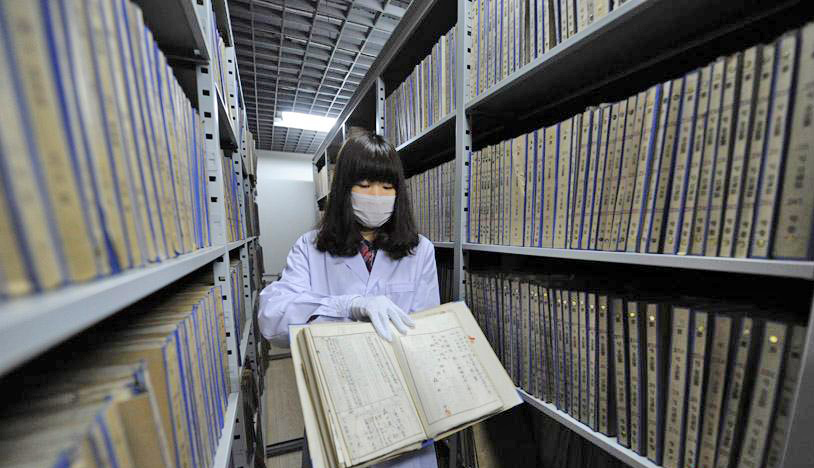Historical documents key to war study

A worker at the Jilin Provincial Archives shows Japanese files detailing the activities of the Imperial Army during Japan’s invasion of China.
The year 2015 marks the 70th anniversary of the defeat of Japan and the end of the world war against fascism. Seven decades ago, the Chinese people fought dauntlessly and defeated the invasion of Japanese militarists, contributing greatly to the success of the allied cause. The story of the Chinese people’s sacrifice was a real-life heroic epic about the triumph of justice over evil.
At this important moment, Chinese scholars are holding seminars and publishing works to commemorate the anniversary, which ushers in a new era in the research of the War of Resistance against Japanese Aggression.
More research released
In recent years, Chinese scholars have made remarkable achievements on the War of Resistance against Japanese Aggression.
“Chinese scholars have discovered and sorted large amounts of new materials and now have a bigger say in this field,” said Zang Yunhu, a professor of the Department of History, Peking University.
Edited by Zhang Xianwen at Nanjing University, A Collection of Historical Materials Relating to the Nanjing Massacre consists of more than 70 volumes and is the most detailed and accurate collection on the subject.
“The collection allows for a more convincing refutation of the fallacies presented by right-wing forces in Japan,” Zang said.
The Tokyo War Crimes Tribunal played a crucial role for the establishment of the international order after the World War II. For a long time, however, very few Chinese scholars have conducted research on it. But, breakthroughs have been made in the area in recent years. The 80-volume Transcripts of the Proceedings of the International Military Tribunal for the Far East, co-published by Shanghai Jiao Tong University and the National Library of China, has collected the complete records of the proceedings and provides first-hand documents about the trial.
Xiang Longwan, honorary director of the Center for the Tokyo Trial Studies at Shanghai Jiao Tong University, said that based on the transcripts, Chinese procurators stated facts instead of making accusations in court and they found evidence of opium trade and other crimes from Japanese archives and classified telegrams.
Last year saw the 120th anniversary of the Sino-Japanese War of 1894-1895 and the establishment of a national public memorial day of the Nanjing Massacre. The State Archives Administration of China published online confessions of 45 Japanese war criminals on trial and the Jilin Provincial Archives released a set of archives and historical materials about the attack.
Yang Bojiang, deputy director of the Institute of Japanese Studies at the Chinese Academy of Social Sciences, said, “The exploration, arrangement and research of new materials have further detailed the atrocity of Japanese militarism and struck a powerful counterblow to the attempt by right-wing Japanese forces to deny and whitewash the act of aggression.”
New areas explored
Meanwhile, Chinese scholars have been expanding the scope of research, leading to new findings, Zang said. For instance, the Party History Research Center of the CPC Central Committee has conducted a decade of research on the casualties and property loss in China during the War of Resistance against Japanese Aggression and has so far published the 12-volume Nationwide Massacres during the War of Resistance against Japanese Aggression and five-volume Archives on the Casualties and Property Loss of the Eighth Route Army during the War of Resistance against Japanese Aggression.
The theme of the 2015 annual meeting of the Society of Chinese Modern History will focus on the War of Resistance against Japanese Aggression and the rejuvenation of the Chinese nation, he added.
Another perspective is to examine China’s fight against the Japanese invasion by looking at it within the context of world history. The book Chinese War of Resistance against Japanese Aggression and the World Anti-Fascist War by Hu Dekun, places the War of Resistance against Japanese Aggression against the international backdrop of the 1930s. It reveals that the establishment of the frontline in China was a forerunner for the global anti-fascist war.
Voice of peace expressed
Through the commemoration and research of the events that transpired seven decades ago, Chinese scholars intend not to express hatred but to call on people to keep the peace.
As Han Dongyu, vice-president of Northeast Normal University, said, “Unlike moral indignation and emotional expression, reasonable and thorough analysis of the ins and outs of wars can prompt people to make introspection.”
Han emphasized that promoting academic reason, a correct view of history and reflecting upon war tragedies from a peaceful standpoint are conducive to maintaining lasting peace and stability, while disregarding historical facts and advocating militarism do nothing but harm. However, some right-wing Japanese scholars have insisted on covering up the violent truth and playing the victim, he said.
“Instead of rhetorical argument, we should resort to empirical approaches and actual data,” he said.
In addition, Han suggested that the study should not be limited to a qualitative analysis that divides Japanese scholars into left and right wings. In the early years after the end of World War II, many Japanese scholars underwent sincere self-reflection of the war, and the right wing was unwelcome.
However, with the rapid growth of China, some left-wing scholars began to shift positions out of anxiety over the rise of China.
“To tackle new problems and make progress in research, our study should depart from the contemporary reality of China-Japan relations, overcoming the rigid existing academic framework,” Han said.
Mao Li is a reporter at Chinese Social Sciences Today.

 PRINT
PRINT CLOSE
CLOSE